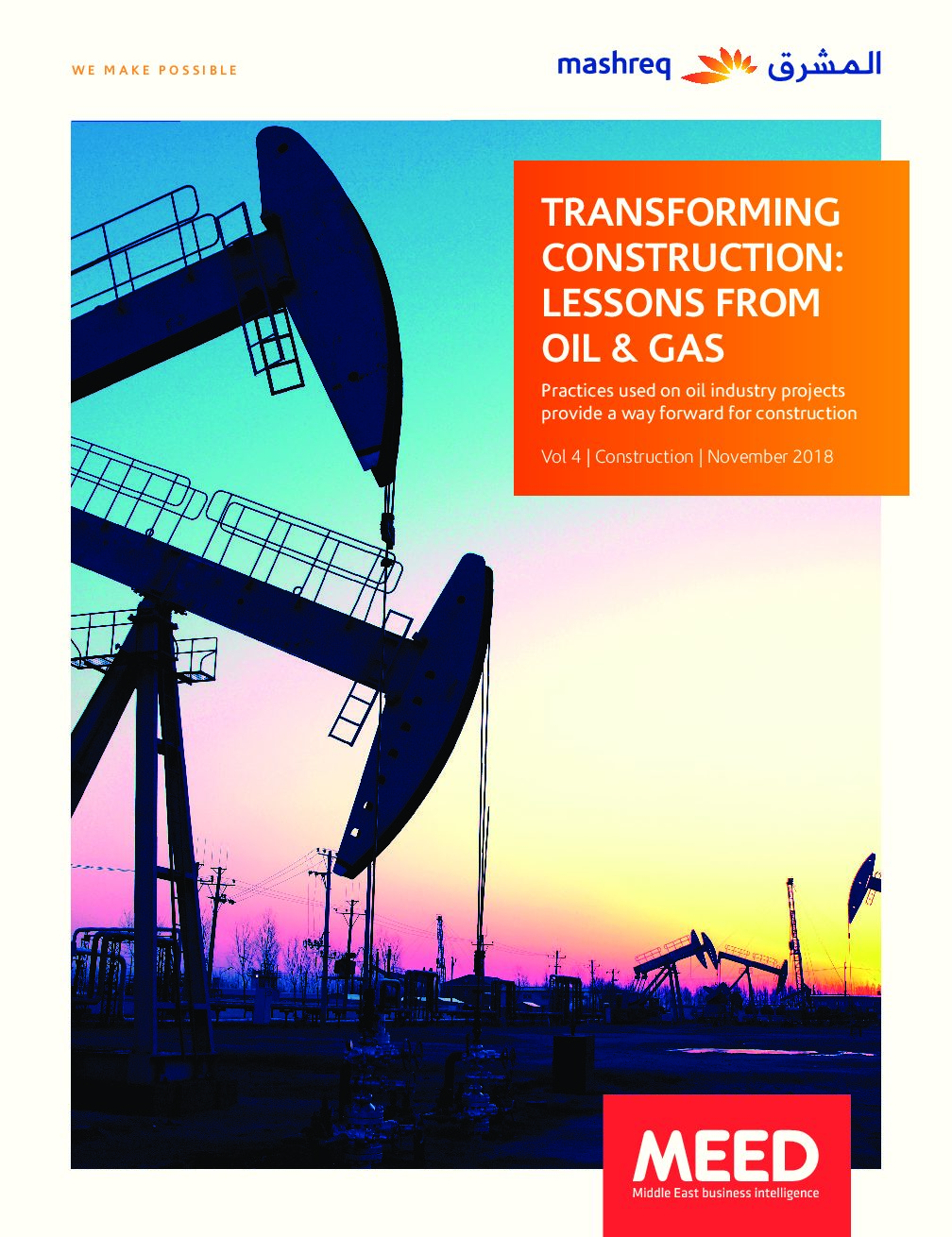Transforming Construction: Lessons from Oil & Gas

IMPARTING KNOWLEDGE: The region’s construction industry is in a state of revival and can learn valuable insights from its oil and gas counterpart
With nearly $1.6tn-worth of major building and infrastructure projects planned or underway across the GCC, there is no doubting the vital role the construction industry plays in the region.
Yet despite its size and importance, the GCC construction industry faces challenges that are undermining the delivery of projects, the implementation of national visions and the sustainability of the industry itself.
Many of the problems are common to construction around the world. But the slowdown in investment in capital projects in the GCC since 2015 has exposed chronic weaknesses in the region’s construction industry.
These weaknesses, which include time-consuming disputes, cost and time overruns, safety flaws, payment delays and a lack of innovation, all stem from the basic principle of “lowest price wins” that underpins much project procurement in the region’s construction sector. It is clear to everybody involved in the industry that change is needed. The question is, how?
In its previous series of reports published in 2017/18, the MEED/Mashreq Construction Partnership examined the opportunity to improve the way projects are delivered in the GCC by harnessing the latest innovations and technologies that are being pioneered on best-practice projects around the world.
But construction clients and contractors can also gain valuable insights by looking at how other industries have responded to similar challenges.
With $168bn-worth of projects planned or underway across the GCC, the oil and gas sector is considerably smaller than the construction industry in terms of the number of projects and the overall value of project spending. But despite this, it has much to offer in terms of project delivery.
The characteristics of the oil and gas projects market are fundamentally different to those of the general construction projects sector. Individual projects in the oil and gas sector are generally delivered on a far bigger scale than most construction projects, and they involve the delivery of complex process engineering systems embedded into their structures.
Crucially, different procurement models are utilised, with engineering, procurement and construction (EPC) contracts typically used, along with integrated supply chain management systems and long-term services agreements. Most important of all, the clients typically have a longer-term vision that is centred around national objectives.
In this special report, MEED looks at the characteristics of the oil and gas projects market, the opportunities and challenges, and crucially, what lessons the construction industry can learn from how projects are delivered in the GCC oil and gas industry.
The oil and gas industry offers some valuable lessons to share with construction clients and contractors:
■ The GCC’s oil and gas and construction industries share many commonalities in the form of scale of projects, engineering and fabrication requirements, and their inherent dependence on oil export revenues. Yet when it comes to how projects are delivered, the oil and gas sector is viewed far more positively when compared to its construction counterpart, thanks to its successful track record of planning, procurement and operations.
■ The construction and infrastructure sector, covering building, real estate and transport projects, accounts for close to $1.6tn of projects planned or underway in the GCC. The oil and gas industry can claim a mere $168bn-worth of projects planned or underway in the GCC.
■ But crucially, oil and gas projects are on average considerably larger and technically more complex. The average oil and gas project contract awarded since 2013 in the GCC has been about $347m compared with just $56m in the construction and infrastructure sector.
■ And with about 2,035 individual project clients over the past five years, compared to just 86 in the oil and gas sector, the construction industry is far more fragmented and diverse, with its participants ranging from state-run or quasi-privatised developers to smaller clients offering one-off tenders.
■ Many of the challenges facing construction stem from lack of client flexibility. There is opportunity for construction project clients to adopt more strategic procurement models that look beyond the lowest-price-wins tactic.
■ The construction industry is highly adaptable to the urban environment, where every project brings with it bespoke designs. The industry is quick to adapt to new trends. But this results in inefficiencies.
■ Construction projects can reduce costs by utilising innovation, standardisation, better financing models and new design practices.
■ Construction projects tend to be led bottom-up by the supply chain, while oil and gas projects are more engineering and fabrication focused. Standardisation and adoption of technology and modular solutions can help both industries achieve better results.
■ In the oil and gas sector, project contractor-client relations are less confrontational than in the construction industry, and project completion takes precedence. The construction industry can save time and costs by adopting a more collaborative approach.
■ The construction sector has taken huge strides in safety culture and environmental awareness, but needs to reinforce firmer regulations.
If you are interested in learning more about the reports developed by MEED in partnership with Mashreq, or any aspect of our Partnership, please click here.


